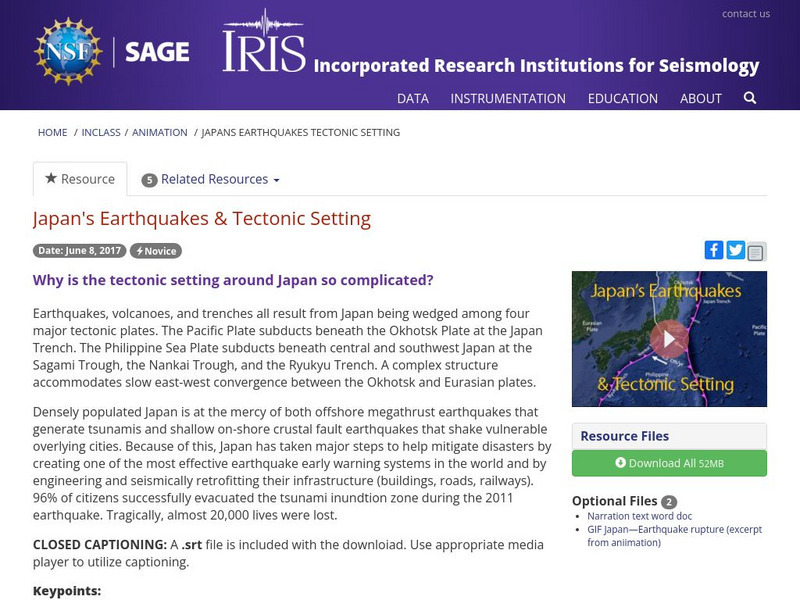Hi, what do you want to do?
Curated OER
Indian Ocean Earthquake and Tsunami, 2004
The BBC reports on the Indian Ocean tsunami that occurred in 2004 off the coast of Sumatra in Indonesia as a result of an earthquake. Footage of the waves and destruction around the area is shown. Maps delineate the quake's epicenter and...
Curated OER
How a Tsunami Forms
This kid knows his stuff. A middle schooler explains the five-step process that occurs as a tsunami forms. He relates his tsunami research to the events that occurred in Japan in 2011. The question he poses can be discussed by you class....
TED-Ed
Real Life Sunken Cities
What made ancient cities sink underwater? What do these cities look like now? A short video describes how earthquakes and tsunamis caused ancient cities to become sunken cities.
PBS
Tsunami Propagation
Could an earthquake in Japan cause flooding in Hawaii or even Chile? Real-time earthquake data from 2011 helped create a computer simulation for future tsunami warnings. Watching the anticipated areas of flooding and the actual tsunami...
PBS
Making North America | The Cascadia Subduction Zone
Scientists discovered a rain forest covered in sand and saltwater residue. This led to a collection of core samples and a rather intense prediction for the future of the American Pacific Northwest. Part of a larger series on the story of...
Bozeman Science
ESS3B - Natural Hazards
Planning and preparing for natural disasters is possible and necessary. A video lesson begins with a description of natural hazards in relation to natural disasters. Using specific examples, the instructor shares strategies for preparing...
Incorporated Research Institutions for Seismology
Iris: Japan's Earthquakes & Tectonic Setting
This animation addresses regional and local tectonics, earthquake occurrences and historic earthquakes, crustal fault earthquakes (Kobe, 1995), megathrust earthquakes (Tohoku-Oki, 2011), and tsunamis. [10:04]
Incorporated Research Institutions for Seismology
Iris: Sumatra: A Tale of Two Earthquakes
2004 and 2012 record two massive earthquakes in the same general geographic area occurred. Find out why the outcomes of both were so different. [4:38]
National Science Foundation
National Science Foundation: When Nature Strikes: Tsunamis
Scientists at Oregon State University study the behavior of tsunamis and how they are formed so they can help people to be better prepared for them. [5:59]
PBS
Pbs Learning Media: Alaska Tsunami
In this video adapted from Alaska Sea Grant, discover why multiple tsunamis resulted from the Great Alaska Earthquake of 1964. Essay, discussion questions, and links to related material included.
National Science Foundation
National Science Foundation: Megathrust Earthquakes
Experts warn that an offshore quake powerful enough to discharge a tsunami could hit the U.S. West Coast anytime. QUEST Northwest talks with geologists and seismologists about cutting edge research in earthquake prediction, and what it...
Bozeman Science
Bozeman Science: Geology
Paul Andersen explains how rock is formed and changed on the planet. The video begins with a brief description of rocks, minerals, and the rock cycle. Plate tectonics is used to describe structure near plate boundaries. Hot spots and...
Incorporated Research Institutions for Seismology
Iris: Plate Boundary: Convergent Margin
A short video illustrates how a megathrust earthquake can create a tsunami. Check out the additional resources provided below the video. [1:16]
PBS
Pbs Learning Media: Waves of Destruction
Learn about the anatomy of a tsunami in this video segment from Nature. Essay, discussion questions, and links to related information included. [1:19]
American Geosciences Institute
American Geosciences Institute: Big Idea 8: Natural Hazards Affect Humans
Watch how natural hazards occur, how they affect our lives and what we can do to prepare for and mitigate their effects. [4:27]
















